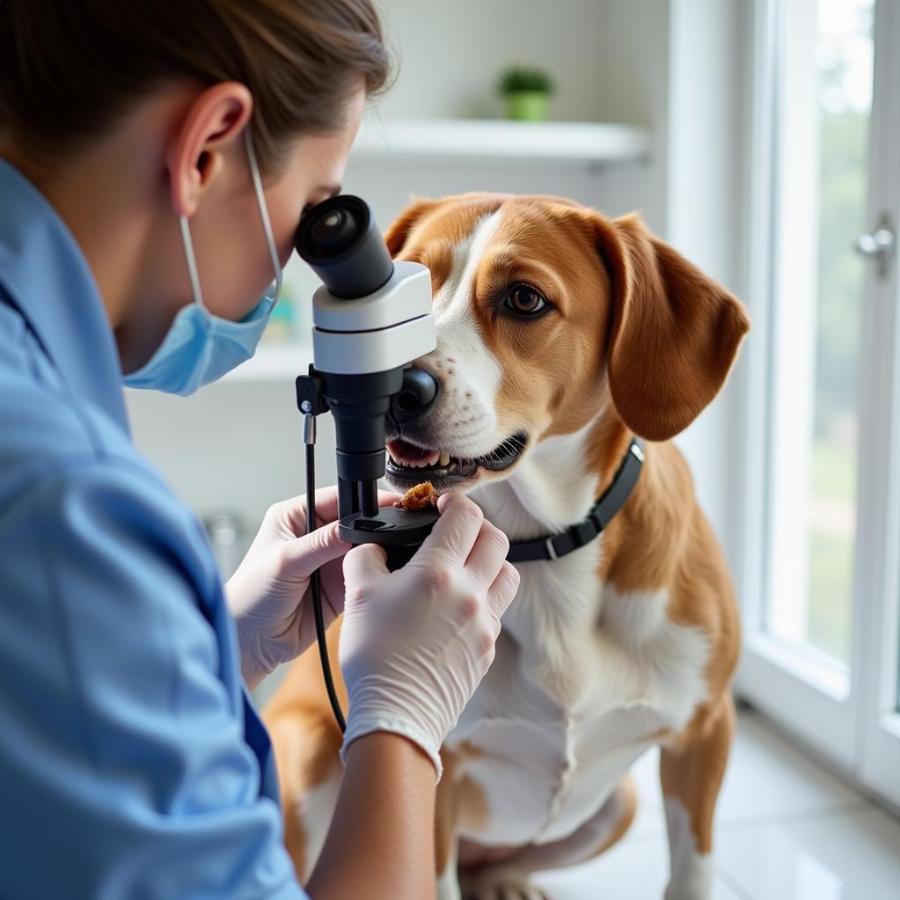Intestinal worms in dogs are a common problem, and recognizing the symptoms of intestinal worms in dogs is crucial for early diagnosis and treatment. These parasites can cause a range of health issues, from mild discomfort to serious illness. Understanding the signs and symptoms can help you protect your furry friend.
Recognizing the Telltale Signs of Intestinal Worms in Dogs
Worms can wreak havoc on your dog’s digestive system, and the symptoms can vary depending on the type of worm and the severity of the infestation. While some dogs may show no outward signs, others can experience a range of noticeable symptoms of intestinal worms in dogs. Keep a close eye on your dog’s behavior and overall health, and consult your veterinarian if you notice anything unusual.
Common Symptoms of Intestinal Worms in Dogs
Some of the most common symptoms of intestinal worms in dogs include:
- Vomiting: This can range from occasional episodes to frequent and severe vomiting. Sometimes, you might even see worms in your dog’s vomit.
- Diarrhea: Worms can irritate the intestinal lining, leading to diarrhea, which can be watery or contain mucus or blood.
- Weight loss: Even with a normal appetite, dogs with intestinal worms may lose weight due to the parasites absorbing nutrients.
- Pot-bellied appearance: Especially common in puppies, a swollen belly can be a sign of a heavy worm burden.
- Scooting or dragging their bottom: This can be a sign of tapeworms, as segments of the worm can irritate the area around the anus.
- Dull coat: A healthy dog has a shiny coat. A dull, dry coat can indicate a health issue, including intestinal worms.
- Coughing: Some types of worms, like roundworms, can migrate through the lungs, causing a cough.
- Lethargy: If your dog seems unusually tired or lacks energy, it could be a sign of worms.
What to Do If You Suspect Your Dog Has Worms
If you notice any of these symptoms of intestinal worms in dogs, it’s important to contact your veterinarian immediately. They will be able to diagnose the type of worm and recommend the appropriate treatment. Early diagnosis and treatment are essential to prevent serious complications.
Diagnosis and Treatment of Intestinal Worms
Your veterinarian will likely perform a fecal examination to check for worm eggs. They may also recommend blood tests or other diagnostic procedures depending on your dog’s specific symptoms. Treatment typically involves deworming medication, which can be administered orally or through injection. heartworm and flea medication for dogs can also be discussed with your vet. It’s important to follow your veterinarian’s instructions carefully and complete the full course of treatment, even if your dog’s symptoms improve.
 Fecal Examination for Intestinal Worms
Fecal Examination for Intestinal Worms
Preventing Intestinal Worms in Dogs
Prevention is always better than cure. Regular deworming is crucial to protect your dog from intestinal worms. Puppies should be dewormed starting at a young age, and adult dogs should be dewormed regularly, as recommended by your veterinarian. Keeping your dog’s environment clean and picking up their feces promptly can also help prevent re-infestation. You may want to consider panacur 4gm for dogs as a preventative measure.
Tips for Preventing Worm Infestations
- Regular Veterinary Checkups: Schedule regular checkups for your dog, including fecal examinations, to detect and treat worms early.
- Hygiene: Maintain a clean environment for your dog, both indoors and outdoors, by picking up feces immediately.
- Prevent scavenging: Don’t allow your dog to scavenge or eat feces from other animals.
- Flea control: Fleas can transmit certain types of worms, so it’s essential to use effective flea control measures.
Conclusion
Recognizing the symptoms of intestinal worms in dogs is essential for their well-being. By being vigilant and taking preventative measures, you can help protect your furry companion from these parasites. If you suspect your dog has worms, don’t hesitate to contact your veterinarian for diagnosis and treatment. Remember, early intervention is key to ensuring your dog’s health and happiness. Concerns about bloody stools in dogs can also be a sign of other problems so always check with your vet.
FAQ
- How often should I deworm my dog? This depends on your dog’s age, lifestyle, and risk factors. Consult your veterinarian for personalized recommendations.
- Can humans get worms from dogs? Yes, some types of worms can be transmitted from dogs to humans. Practice good hygiene, especially after handling your dog or their feces.
- Are all intestinal worms visible in dog feces? Not all worms are visible to the naked eye. A fecal examination by a veterinarian is necessary for accurate diagnosis.
- What are the different types of intestinal worms in dogs? Common types include roundworms, tapeworms, hookworms, whipworms, and heartworms. Consider checking whipworm symptoms in dogs for more information on this particular type.
- Can intestinal worms be fatal in dogs? If left untreated, some types of worms can cause serious health complications and even death, especially in puppies.
Other possible related questions on our website:
Beaut Dogs is your trusted source for all things related to dog care, offering expert advice and comprehensive information on breeds, health, training, and nutrition. Beaut Dogs empowers you to be the best pet parent possible. When needing support please contact Email: [email protected] to have Beaut Dogs assist you in detail and correctly.